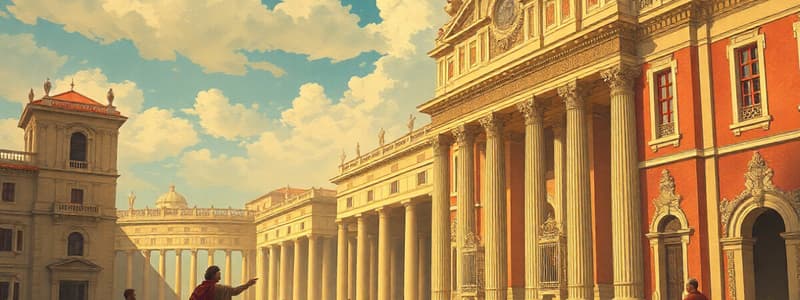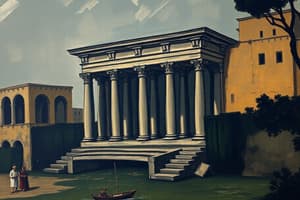Podcast
Questions and Answers
By 145 B.C.E., Roman conquests had brought considerable wealth to the city of ______.
By 145 B.C.E., Roman conquests had brought considerable wealth to the city of ______.
Rome
In 90 B.C.E., some Italians rebelled, and Rome agreed to let all free ______ become Roman citizens.
In 90 B.C.E., some Italians rebelled, and Rome agreed to let all free ______ become Roman citizens.
Italians
An enslaved man named ______ led a famous revolt in 73 B.C.E.
An enslaved man named ______ led a famous revolt in 73 B.C.E.
Spartacus
After defeating Spartacus, the Romans sentenced thousands of the surviving rebels to death on ______.
After defeating Spartacus, the Romans sentenced thousands of the surviving rebels to death on ______.
Generals in Rome used their armies to gain fame and ______ in distant lands.
Generals in Rome used their armies to gain fame and ______ in distant lands.
Pompey and ______ were two ambitious generals who fought for control of Rome.
Pompey and ______ were two ambitious generals who fought for control of Rome.
Pompey had expanded Roman rule in eastern lands like ______.
Pompey had expanded Roman rule in eastern lands like ______.
______ crossed the Rubicon with his army, directly defying the Senate's orders.
______ crossed the Rubicon with his army, directly defying the Senate's orders.
After three years of fighting, the Senate named Caesar ______ for life.
After three years of fighting, the Senate named Caesar ______ for life.
With Caesar in control, the ______ came to an end after nearly 500 years.
With Caesar in control, the ______ came to an end after nearly 500 years.
Study Notes
Expansion and Strain of the Roman Republic
- By 145 B.C.E., Roman conquests had significantly increased wealth but threatened republican ideals.
- Rome's third era of expansion culminated in the collapse of the republic.
- Continuous wars characterized the final years, leading to dissatisfaction among allies forced to pay taxes and serve in the military without citizenship rights.
Social Unrest and Revolts
- In 90 B.C.E., discontent among allies led to a rebellion; Rome responded by granting citizenship to all free Italians.
- Amid territorial expansion, Rome enslaved hundreds of thousands, leading to harsh treatment, though some enslaved individuals gained respect.
- Spartacus, an enslaved man, led a notable revolt in 73 B.C.E., but after defeat, thousands of rebels were executed.
Economic Displacement and Mob Formation
- The influx of enslaved laborers resulted in job loss for many Roman farmers and laborers, creating a precarious social dynamic.
- Displaced workers flooded into Rome, forming a potentially volatile mob, easily influenced by ambitious leaders.
Rise of Military Leaders and Civil Wars
- Roman generals began using their armies for personal gain, fostering competition for power within Rome.
- Sulla led a campaign in the 80s B.C.E. to quell an Italian revolt and secure citizenship, setting a precedent for military intervention in politics.
Conflict between Pompey and Julius Caesar
- A civil war erupted between Pompey, who had expanded influence in Syria and Cyprus, and Julius Caesar, conqueror of Gaul.
- By 49 B.C.E., tension escalated when Pompey, supported by the Senate, forbade Caesar from entering Italy with his army.
- Caesar's decision to cross the Rubicon in January 49 B.C.E. marked a point of no return, igniting further conflict.
Julius Caesar's Ascendancy and Reforms
- After three years of conflict, Caesar defeated Pompey and was appointed dictator for life by a fearful Senate.
- Under Caesar, significant reforms included public works projects, gladiator contests for the poor, and the introduction of the Julian calendar.
- Caesar envisioned expanding Rome into a grand empire, fostering new colonies and citizenship for Gaul and Spain.
Assassination of Julius Caesar and Aftermath
- Caesar was assassinated on March 15, 44 B.C.E., by a group intent on "saving" the republic.
- The assassination paradoxically signaled the end of the republic, leading to the emergence of imperial power.
Studying That Suits You
Use AI to generate personalized quizzes and flashcards to suit your learning preferences.
Description
Explore the tumultuous final years of the Roman Republic from 145 B.C.E. to 44 B.C.E. This quiz covers the impacts of expansion, wars, and the changing dynamics between Rome and its allies. Test your knowledge on the historical events leading to the collapse of the republic.




